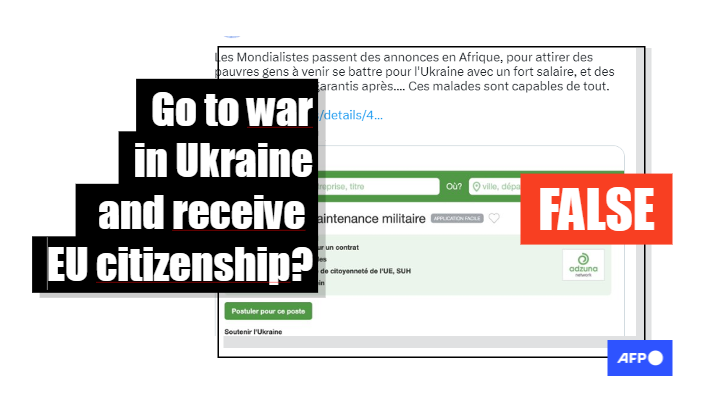A recent job offer for a “military maintenance technician” said it was seeking people to “participate in the Ukrainian counteroffensive”. In exchange, it claimed that “accelerated citizenship in the UK or EU is guaranteed”. The ad was initially posted to a British job search site on May 12, 2023 and has since been repeatedly shared on social media (1, 2).
Promising a salary of 20,000 pounds, the offer explains that the contract is linked to the “EU citizenship programme”. A contact name and email address are provided for applicants.
The offer however is fake: fighting in Ukraine does not make it any easier to become an EU or British citizen.

No EU citizenship programme
The European Commission told AFP on May 23, 2023 that there is no “European Union citizenship programme”.
Instead, there is an EU programme called Citizens, Equality, Rights and Values“, whose objective is “to protect and promote rights and values as enshrined in the EU Treaties and the Charter of Fundamental Rights. In particular, by supporting civil society organisations active at local, regional, national and transnational level.”
But the Commission stressed that the programme has nothing to do with acquiring citizenship. There is no mention of accelerated EU citizenship in the documents annexed to the programme’s description (1, 2, 3, 4).
What’s more, to become a citizen of the European Union, one must first become a citizen of an EU member state.
Member state jurisdiction
As guardian of the treaties, the European Commission explains that “every person holding the nationality of a Member State shall be a citizen of the Union. Citizenship of the Union shall be additional to and not replace national citizenship”. That rule is included in Article 20 of the Treaty on the Functioning of the European Union.

According to the Commission, a system that accelerates the acquisition of EU citizenship “cannot exist” because “the law does not provide for this in that order”.
The French information site Viepublique.fr explains that citizenship “is attributed exclusively by the member state”. It is therefore up to each member state to decide on their own rules for obtaining citizenship. The authorities of every EU nation choose whether or not to confer citizenship on a person.
Myriam Benlolo-Carabot, a professor of public and European law at the University of Nanterre, does not rule out the possibility that certain member states could introduce “as a ‘reward’ the conferral of citizenship for acts of heroism”.
One country that has already taken such measures is Russia. As AFP reported in September 2022, Moscow has made Russian citizenship easier to obtain for foreign nationals who fight in its army. Individuals who have served for at least one year can apply for citizenship without the usual requirement of having lived in Russia for at least five years.
“For an African national to become an EU citizen, they must obtain citizenship of a member state of (the European Union). There is no other way. Citizenship of a (member state) is an essential prerequisite,” Benlolo-Carabot said.
As for the United Kingdom, which is no longer an EU member, it decides on its own terms of citizenship conferral like any other country. The interior ministry site provides all of the relevant details. For example, non-nationals born in the UK are eligible for citizenship depending on when they were born and their parents’ circumstances. There is no mention of a sped-up citizenship process for those who have joined the Ukrainian army.
Acquiring the citizenship of an EU member is a long and often difficult process. In France, for example, the public service website explains that the requirements vary depending on whether the person was born abroad or in France. In both cases, the person is required to have lived in France for a certain period of time.
Combat experience in Ukraine is not one of the criteria that make it easier to become French.

France does offer the possibility of obtaining French citizenship on the basis of military service, but the rule only applies to its own army.
A person “may also acquire French nationality on a proposal from the minister of defence” and the individual “can be naturalised if he was wounded on a mission during an operational engagement,” according to France’s public service website.
Interior ministry figures from 2022 show that the number of French naturalisations has gone down to 78,111 from 94,092 in 2021. Last year’s level was similar to pre-pandemic numbers (77,778 in 2018, 76,710 in 2019).
Berfin TOPAL
AFP France
Translated by Anna Maria JAKUBEK

- Home
- About AFP
- How we work
- Editorial & Ethical standards
- Fact-Checking Stylebook
- Meet the team
- Training
- Subscribe
- Contact
- Corrections
Copyright © AFP 2017-2023. All rights reserved. Users can access and consult this website and use the share features available for personal, private, and non-commercial purposes. Any other use, in particular any reproduction, communication to the public or distribution of the content of this website, in whole or in part, for any other purpose and/or by any other means, without a specific licence agreement signed with AFP, is strictly prohibited. The subject matter depicted or included via links within the Fact Checking content is provided to the extent necessary for correct understanding of the verification of the information concerned. AFP has not obtained any rights from the authors or copyright owners of this third party content and shall incur no liability in this regard. AFP and its logo are registered trademarks.
